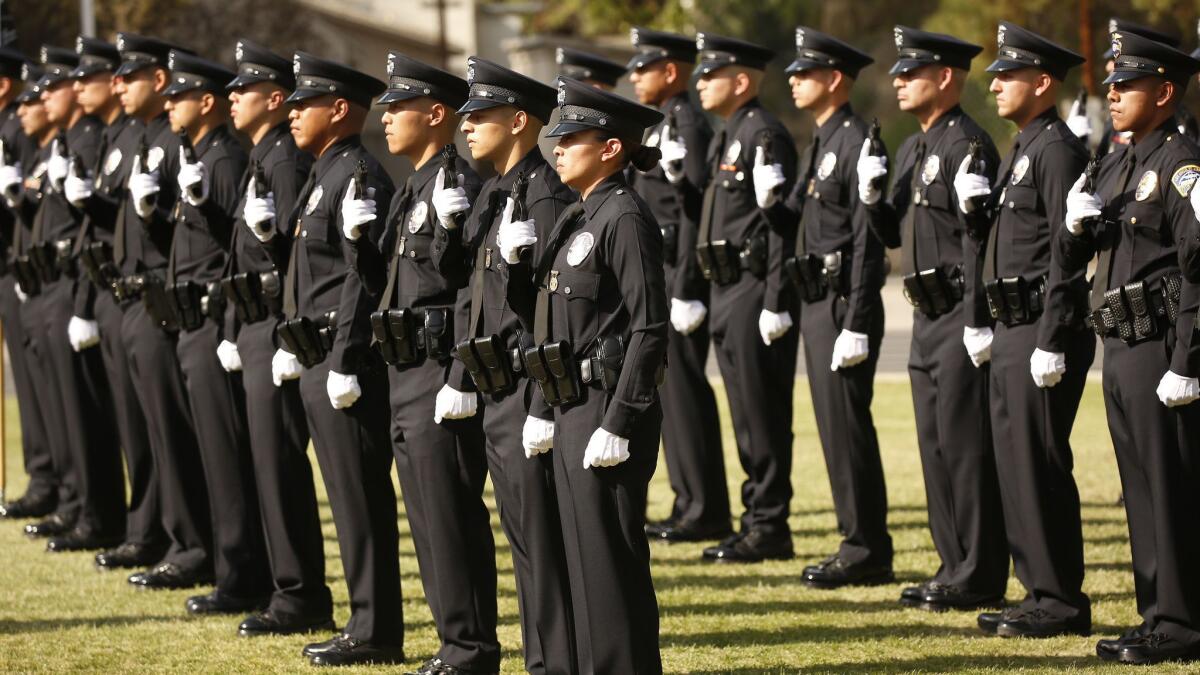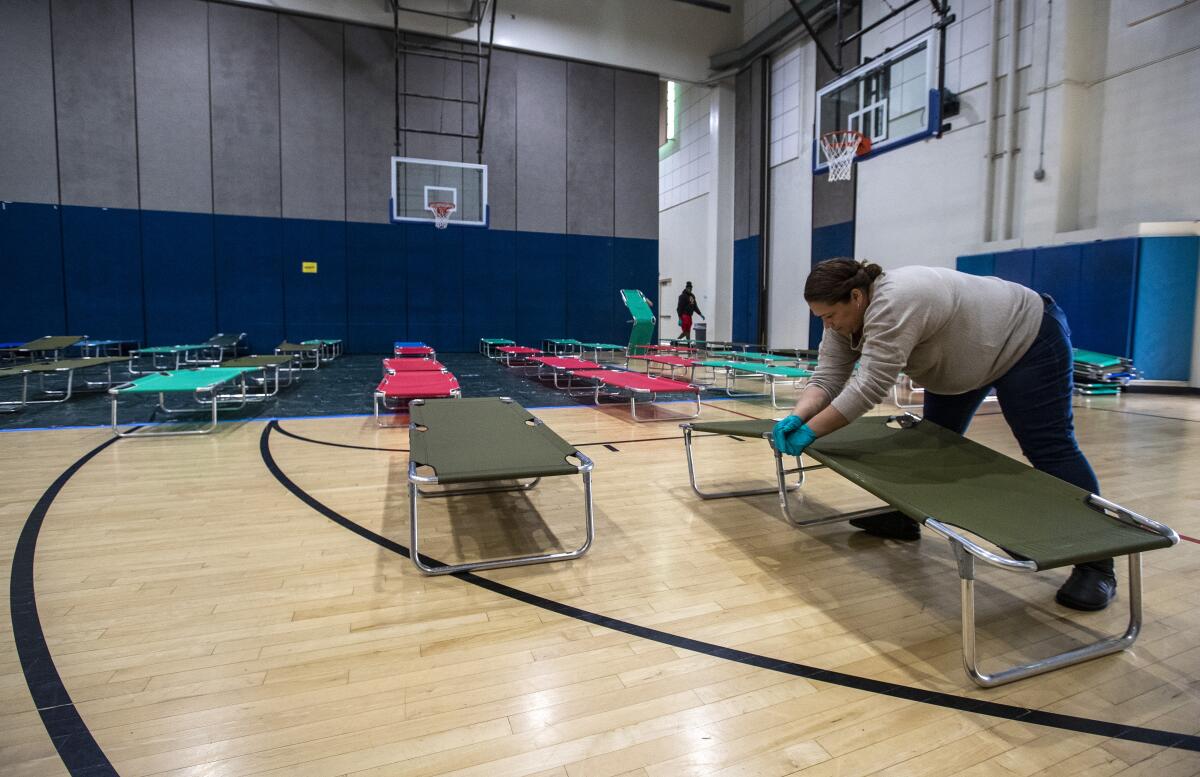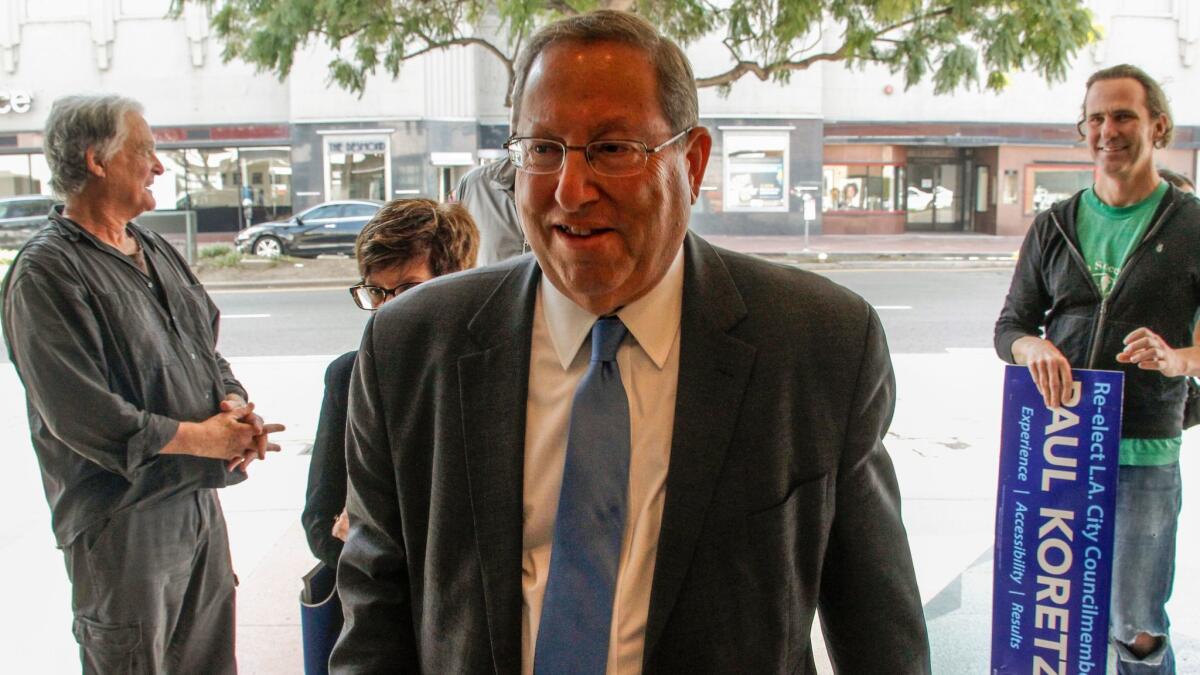Despite a budget crisis, L.A. officials give new bonuses to officers with college degrees

- Share via
The Los Angeles Police Department is set to award officers who have college degrees nearly $41 million in bonuses in the coming budget year, even as thousands of other city employees face pay cuts amid a financial crisis at City Hall.
Mayor Eric Garcetti and the City Council signed off on the new LAPD “education incentives” last summer, paving the way for officers with associate’s degrees to receive an extra $190 every two weeks and for those with bachelor’s degrees to get an extra $290.
The education bonuses went into effect last month, just as projected tax revenues from hotels, restaurants and retail stores plummeted as a result of the coronavirus shutdowns.
In addition to those payouts, LAPD officers are on track to receive 4.8% in pay raises in the fiscal year that starts July 1. The raises and bonuses are part of the city’s newest contract with the Los Angeles Police Protective League, the union that represents rank-and-file officers.
The three-year contract offers the latest evidence that L.A.’s financial challenges are fueled not only by the COVID-19 pandemic, but also by the decision by Garcetti and the council to provide more generous pay and benefits to city workers.
City budget analysts warned last fall that more expensive salary agreements with employee unions would turn projected budget surpluses into deficits in the coming years.
The police union contract is expected to cost the LAPD about $123 million in the coming budget year, according to the city’s financial analysts. Over the same period, Garcetti is hoping to secure $139 million in furloughs from nearly 16,000 civilian city workers, who are being asked to take a 10% pay cut.
The growth in police officer salaries and benefits comes as Black Lives Matter, Ktown for All and other activist groups are pushing for reductions in law enforcement spending, arguing that the city spends too much on the LAPD and not enough on housing and social services.
Spike Friedman, an organizer with the advocacy group Ground Game LA, said city leaders should roll back the pay of LAPD officers and use the savings to fund increased services for homeless people, relief payments to renters, and Vision Zero, Garcetti’s program to reduce the number of traffic deaths citywide.
“Many city employees are being asked to take a haircut right now, and a pretty significant one. And amidst this crisis, I don’t think L.A.’s police union should be so uniquely powerful that their officers aren’t facing the same situation,” said Friedman, whose group endorsed Bernie Sanders during the recent Democratic presidential primary.

Garcetti’s deputy chief of staff, Matt Szabo, defended the raises and bonuses, saying they’re needed to keep LAPD salaries competitive with those at other public-safety agencies. Although the bonuses went into effect last month, they were approved by the council in August, when the economy was still strong and coronavirus was not yet a threat, he said.
Nine months later, with much of the city still shut down, the mayor is seeking cuts to such services as street repairs, tree trimming, graffiti removal and the city’s 311 public-services hotline.
Despite those cuts, the mayor’s team has not asked the police union to postpone the coming raises and bonuses, Szabo said. Officers are helping homeless outreach teams with testing and health assessments and working assignments at emergency shelters, he said.
“Now is not the time to ask our front-line first responders to renegotiate contacts in the middle of a pandemic,” Szabo said.
Council members plan to review Garcetti’s budget over the next month. The spending plan would increase the LAPD budget by 7.1%, even though nearly 2,400 of the department’s civilian employees are slated to receive pay cuts.
By comparison, the Housing and Community Investment Department — which sends inspectors to look for violations at apartment buildings — will see a 9.4% cut under Garcetti’s budget. The Department of Animal Services, which operates animal shelters and spay-and-neuter programs, is on track to receive a 14.5% reduction.

Bob Schoonover, president of Service Employees International Union Local 721, one of the unions whose members are facing furloughs, voiced alarm over the planned cuts. He said his union’s members — including tree trimmers, custodians, janitors and others — are also being deployed to help with the city’s coronavirus response.
“Our members strongly believe there are other alternatives and less harmful solutions to consider before adding further strain on L.A.’s working families,” he said in an email.
Law enforcement experts say education bonuses can help police departments attract officers who are familiar with legal statutes, trained in technology or skilled at defusing tense situations. Research has shown that officers who earn undergraduate and graduate degrees generally do better in “dealing with complex and challenging circumstances,” said Police Chief Michel Moore.
“Their decision-making process and their ability to untangle complex issues is informed and is improved by their exposure to higher education,” he said.
More than 6,300 officers, or nearly two-thirds of the rank-and-file, will be eligible for the education bonuses, according to the city’s budget analysts. Craig Lally, president of the Police Protective League, said the bonuses would ensure that the city benefited from having “a more qualified, highly educated police department.”
“The nature of police work has evolved, and the expectations and demands placed upon police officers have increased,” he said. “In addition to being police officers, we are also now therapists, drug treatment counselors, social workers and EMTs, among many other things.”
Pete White, executive director of the antipoverty group Los Angeles Community Action Network, argued that the LAPD should not be responsible for such assignments. When police officers respond to people experiencing homelessness, mental illness or substance abuse issues, the outcome is more likely to end in violence than if a social worker were to respond, he said.
“The last person you want to send to deal with a person going through a bout of mental illness is a person with a badge and a gun,” said White, whose group is seeking a reduction in the LAPD’s budget. “Because those outcomes are oftentimes bad.”

The Police Protective League has played a role in city elections over the past decade, endorsing candidates and putting money behind their campaigns. In February, for example, the union spent nearly $45,000 on mailers promoting Councilman David Ryu’s campaign for reelection in a Silver Lake-to-Sherman Oaks district.
Critics have repeatedly complained that the city’s elected officials approve public employee salary agreements without vetting the details in public. When the council took up the police union contract last summer, they had no discussion and voted for it unanimously.
Council members also did not ask any questions during the personnel committee meeting called to review the new police contract.
Councilman Paul Koretz, who heads the committee, said the terms of the contract helped the city avoid “the threat of a labor dispute.” Officers who put their lives on the line deserve to receive both cost of living increases and “modest bonuses,” said Koretz, who is running for city controller in 2022.
“Had we known that we would go from 10 years of recovery to the worst drop in our country’s history, our whole 2019 budget would have been different,” Koretz said. “However, the merit of this incentive is still there.”
More to Read
Sign up for Essential California
The most important California stories and recommendations in your inbox every morning.
You may occasionally receive promotional content from the Los Angeles Times.












